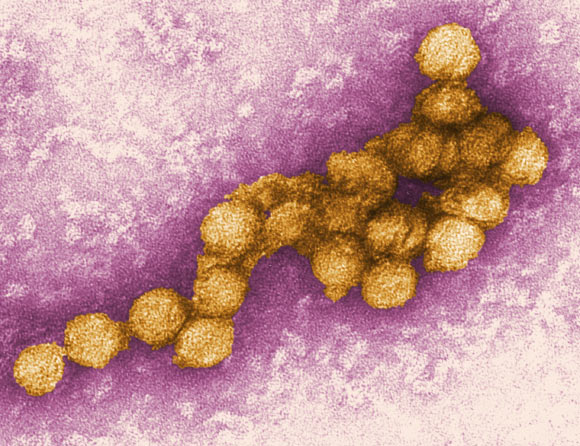A research team led by Vanderbilt University Medical Center scientists has isolated a human monoclonal antibody that can ‘neutralize’ the West Nile virus.

This is a digitally-colorized transmission electron microscopic (TEM) image of the West Nile virus. Image credit: Cynthia Goldsmith / P.E. Rollin / CDC.
West Nile virus (WNV), a member of the Flavivirus genus, is a virus most commonly spread to people by mosquito bites.
This virus is a leading cause of viral encephalitis (brain inflammation) in the United States.
“WNV is still an important cause of brain infections in the United States, and there is very little we can do to help these patients,” said Dr. James Crowe Jr., Director of the Vanderbilt Vaccine Center.
“It was exciting for us to use our antibody discovery technologies to find naturally occurring human antibodies that can prevent or treat the infection.”
In the new study, Dr. Crowe and co-authors obtained serum and blood cell samples from 13 adults who were infected by the virus during the 2012 outbreak of West Nile encephalitis in Dallas, Texas.
Antibody-producing white blood cells from the subjects were fused to myeloma (cancer) cells to produce fast-growing ‘factories’ of specific, monoclonal antibodies.
One of these antibodies, WNV-86, completely inhibited the virus in laboratory studies.
A single dose of WNV-86 completely protected mice from an otherwise lethal West Nile infection.
“Further studies are needed before human testing can begin,” the researchers said.
“But these findings are raising hopes for development of the first effective way to counter this potentially dangerous infection.”
The results were published online November 19, 2018 in the journal Nature Microbiology.
_____
Leslie Goo et al. A protective human monoclonal antibody targeting the West Nile virus E protein preferentially recognizes mature virions. Nature Microbiology, published online November 19, 2018; doi: 10.1038/s41564-018-0283-7







